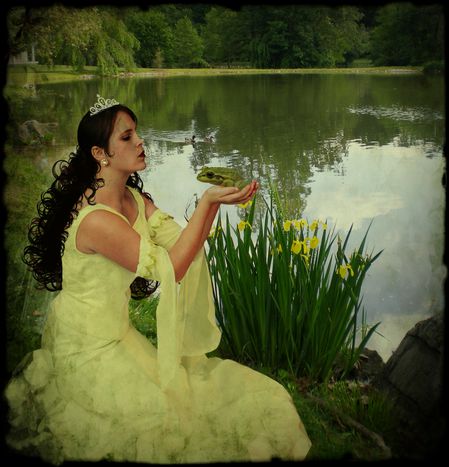
European Charm: Wooing Georgia and Moldova
Published on
Wedged between Putin's imperial dreams of grandeur and the modern European chevalier of human rights, Georgia and Moldova find themselves in a rather precarious situation of choosing between two would-be prince charmings.
On June 27, 2014, the European Union extended its tentacles further eastward by signing association agreements with Georgia and Moldova, two oft-forgotten countries. One lies next to the heart of the continent near Romania, while the other is nestled deep in the Caucasus Mountains on the periphery of Europe, bordering Russia. Despite their geographic distance, both have struggled to ensure their national self-determination vis à vis the power of Russia and the European Union. Instead, they have been entangled in a romantic fairytale gone sour.
Since the fall of the Soviet Union, eastern Europe has been the site of a love triangle worthy of any Shakespearen drama. Both dashing Russia and alluring Europe have been trying to woo this besieged belle for decades. Some states, such as Belarus, Azerbaijan and Armenia, have remained faithful to Russia, while others, including Georgia and Moldova, have betrothed themselves to Europe. By pledging their allegiance openly, both countries face threats of retaliation from their former Soviet master without the ensured protection that would come with membership in the European Union.
A Declaration of Amore
In Europe's courtship of Georgia and Moldova, the association agreement is a public declaration of love, a vow to enrich each others' existence via the relationship. In exchange for greater access to the European market, Tbilisi and Chisinau commit to adopting EU standards such as free market regulations and quality controls. Both already have strong economic ties to the Bloc: Moldova sends over half of its exports to the EU, while Georgia-EU exchange goods for a combined total of 2.7 billion euros. As a gesture of their noble intentions and continued Russian belligerence, citizens of Moldova were granted visa-free access to the Schengen zone in April, while Georgians eagerly await their turn. In the case of Georgia, the modest country has been thrust into a position of leadership in the region, surpassing its neighbours as the new centre of power in the Caucasus. In return, Georgia is of high strategic importance for the EU in order to secure energy supplies to the continent, as Russian sources are no longer certain due to the current circumstances. Perhaps, of utmost importance, such a pact is the first step down the long route towards highly-coveted EU membership.
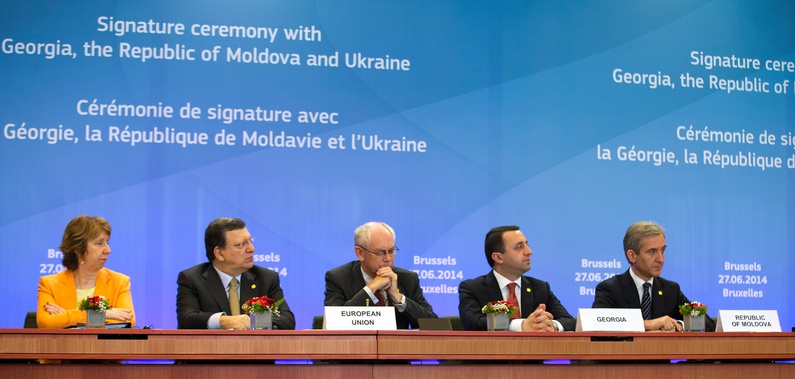 However, this covenant is most significant for citizens, particularly those who envision their future within the European Bloc. "This agreement is proof that the Moldovan government has done at least something right in their attempt of implementing reforms," says Valeria Munteanu, from Moldova. "Even though there is a long way to go, it is fulfilling to have the EU validate Moldova’s efforts through this agreement."
However, this covenant is most significant for citizens, particularly those who envision their future within the European Bloc. "This agreement is proof that the Moldovan government has done at least something right in their attempt of implementing reforms," says Valeria Munteanu, from Moldova. "Even though there is a long way to go, it is fulfilling to have the EU validate Moldova’s efforts through this agreement."
"This agreement has an important symbolic meaning to Georgians," explains Christina Tashkevich, a political journalist from Tbilisi. "We’ve committed ourselves to be part of an European family, and that’s why symbolically it means to many Georgians as this agreement is some sort of validation of this status of a European (Western) state for Georgia. And of course, additionally, and maybe more importantly, this agreement serves as an important message to Russia, that Georgia is moving further from the Russian influence and never would be back under Moscow’s heel again."
Menage à Trois
It is tricky to maneuver through the perilous threat of the seething jealousy of a lover scorned. Russia's possessiveness of its former satellites has not dampened; it is currently engaged in territorial disputes with Georgia and supports pro-Russian groups in Moldova. In 2008, Russia unofficially annexed two Georgian regions: South Ossetia and Abkhazia, leading to an armed conflict that jeopardised the delicate peace in the area. In a situation reminiscent of Ukraine, pro-Russian separatists have been occupying Transnistria, a long strip of eastern Moldova, since the early 1990s. Is it possible to co-exist peacefully with Russia while in a union with Europe?
"In a perfect world that would be possible," laments Valeria. "Moldova has never been an aggressive country; on the contrary the aggression has always come from the outside. The size of the territory, the number of the population and limited resources is not in favour of Moldova being in conflict with neighboring countries. Over history, the geographical location of Moldova has created a strong interest in Russia, mainly due to its proximity to the Black Sea and Europe."
"I think Russia would grow more and more upset to see Georgia’s closer integration into the EU," worries Christina. "Therefore, we should always stay watchful in our relations with Russia, and judging from the imperialistic ambitions of the Russian president (Vladimir Putin — Ed.), the relations between Russia and Georgia would stay in a tense, or even hostile, mood well into the future."
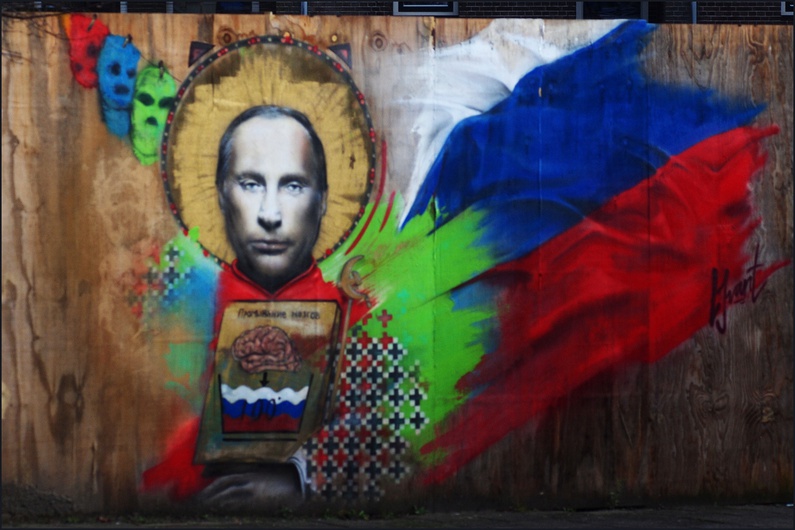 Moldova is already paying the price of an agreement with Europe, as Russia applies economic pressure via trade restrictions, and military aggression aimed at inciting uprisings in sensitive regions like Transnistria. On July 22, Russia banned Moldovan fruit from their market, on top of the restrictions on wine imports. Although described by Moscow as temporary, it is unsure if the ban will ever be lifted.
Moldova is already paying the price of an agreement with Europe, as Russia applies economic pressure via trade restrictions, and military aggression aimed at inciting uprisings in sensitive regions like Transnistria. On July 22, Russia banned Moldovan fruit from their market, on top of the restrictions on wine imports. Although described by Moscow as temporary, it is unsure if the ban will ever be lifted.
"Unfortunately, Moldova is vulnerable from many points of view, such as economic, social and military," explains Valeria. "Russia is well aware of that and, as you can see from the media almost each day, Russia is introducing new trade restrictions for imports coming from Moldova and this is very much connected with the Association Agreement with the EU. It becomes clear that the decisions taken by the Moldovan government to tighten the relations with the EU are not pleasing the Russian government. It is a tough time for Moldova because the relations with the EU are still at its incipient phase and some of the Russian restrictions are actually frightening the population. Moldova could have a peaceful relationship with Russia and the EU, only when Russia starts regarding Moldova as a truly independent country, capable of deciding its own destiny, and not its disobedient ex-Soviet child who needs to be punished."
A Sullied Reputation
What lays beyond the borders of the European Union remains rather mysterious and unknown to the majority of Europeans. Both Georgia and Moldova are plagued with sullied reputations as developing post-Soviet wastelands or little clones of Russia deprived of democracy and human rights. Moldova is often depicted as the poorest country in Europe and has earned notoriety as one of the biggest suppliers of sex workers to the European market. Georgia is often confused with the American state of the name; sometimes it is even excluded from Europe, as it lies at the crossroads of two continents, creating a repetitive interrogation of whether it is European or Asian.
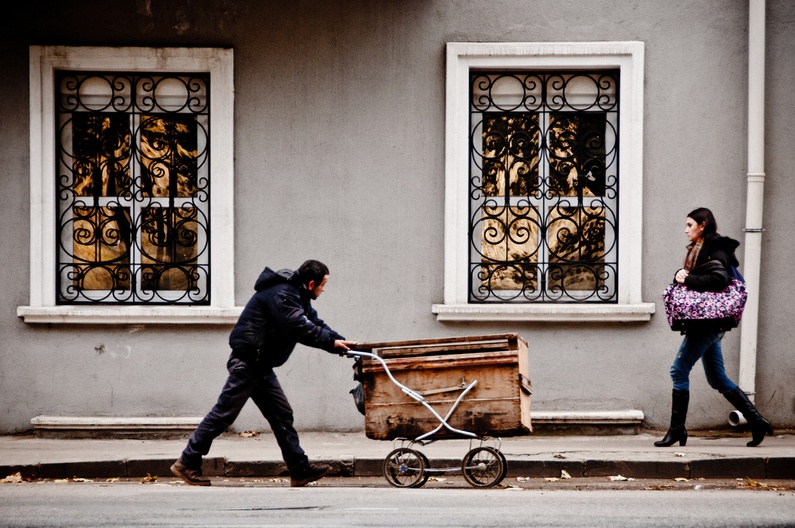 Despite challenges to their Europeanness, most Georgians are clear of their identity. "I can remember the words of the late Prime Minister Zurab Zhvania, when he said in his speech to the European Council: 'I am Georgian, therefore I am European', " declares Christina. "Most Georgians think themselves as part of the European family and strongly believe that we share the same values with the EU countries."
Despite challenges to their Europeanness, most Georgians are clear of their identity. "I can remember the words of the late Prime Minister Zurab Zhvania, when he said in his speech to the European Council: 'I am Georgian, therefore I am European', " declares Christina. "Most Georgians think themselves as part of the European family and strongly believe that we share the same values with the EU countries."
However, times are a-changing, as old stereotypes disintegrate in an age of globalisation. "I’m happy to observe that more and more people in Europe learn about Georgia, are interested to come and visit Georgia," she reflects. "But we should continue to work on popularisation of the rich Georgian culture and uniqueness in the EU. Some people still, when they ask me where I come from and hear Georgia, think a minute and then ask, 'Oh, is this the country near Russia? You had war with Russia?' Of course, understandably Georgia came into the news in 2008 during the war with Russia, but I think we, as a country, need to work more to show Europe why Georgia is unique as it is."
"From my own experience, not many Europeans know where Moldova is even located," says Valeria, sadly. "Moldova has been going through many changes ever since the Soviet Union collapsed but it’s still a relatively new independent country. Maybe a misconception about Moldova would be the assumption that Moldovans are actually Russians. There are still many headlines circulating such as Moldova being the poorest country of Europe, which sometimes makes it sound worse than it actually is. Maybe it is still indeed so, considering various economic indicators, but the way I see it, Moldova has huge intellectual and agricultural resources, which are an indicator of potential."
Chasing the European Dream
As Russia heightens its anti-EU offensive in former Soviet states, many buckle under the pressure exerted by Putin. Remarkably, Georgia and Moldova, along with Ukraine, have withstood attempts to meddle in their affairs. They are outliers who rush to eagerly embrace Europe, in an effort to jettison their troubled relationship with Russia, and try their hand at a new romance with the European Union.
"I think there’s definitely a possibility for (Georgia to join the EU — Ed.). I believe that this agreement is certainly a right step in this direction, but Georgia should not now sit down, relax and think that the job is done. The reforms in the country should continue, democratic institutions should be straightened, as well as the work should continue on following rule of law and protection of human rights. There’s still a lot to be done, and that’s what Georgia should focus on."
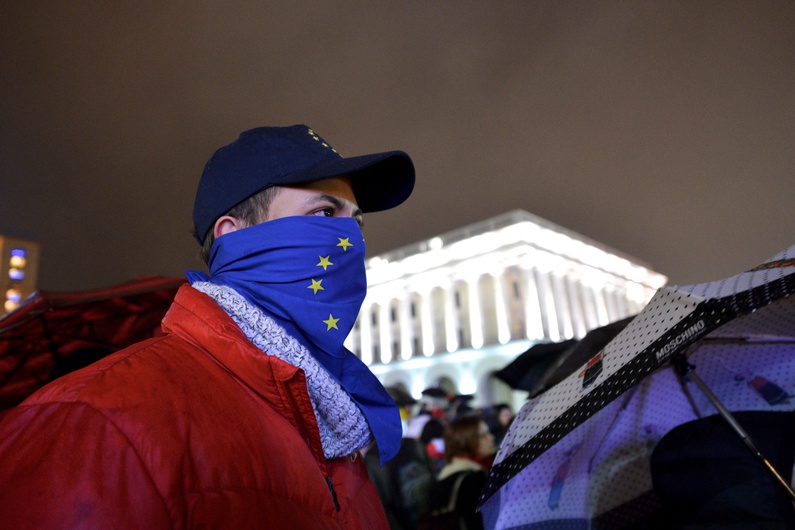 For Valeria, the long-awaited agreement couldn't come soon enough. "To me, it means a different perspective and maybe even a relief that the country is interested in offering its citizens new European opportunities. When giving it an extra thought, at the end of the day, getting closer to the EU is about people — setting common values, creating frameworks, promoting tolerance and freedom, ensuring a prosperous economic development, eliminating barriers. I came to the conclusion that Moldovans desire most of all to be the owners of their own destiny, while having access to opportunities to sustain their aspirations. Therefore, I am a strong believer that the newly-signed Association Agreement with the EU has a much deeper meaning than the legal and economic technicalities of it. It’s more of a symbol that the country is finally shifting to a modern direction."
For Valeria, the long-awaited agreement couldn't come soon enough. "To me, it means a different perspective and maybe even a relief that the country is interested in offering its citizens new European opportunities. When giving it an extra thought, at the end of the day, getting closer to the EU is about people — setting common values, creating frameworks, promoting tolerance and freedom, ensuring a prosperous economic development, eliminating barriers. I came to the conclusion that Moldovans desire most of all to be the owners of their own destiny, while having access to opportunities to sustain their aspirations. Therefore, I am a strong believer that the newly-signed Association Agreement with the EU has a much deeper meaning than the legal and economic technicalities of it. It’s more of a symbol that the country is finally shifting to a modern direction."



